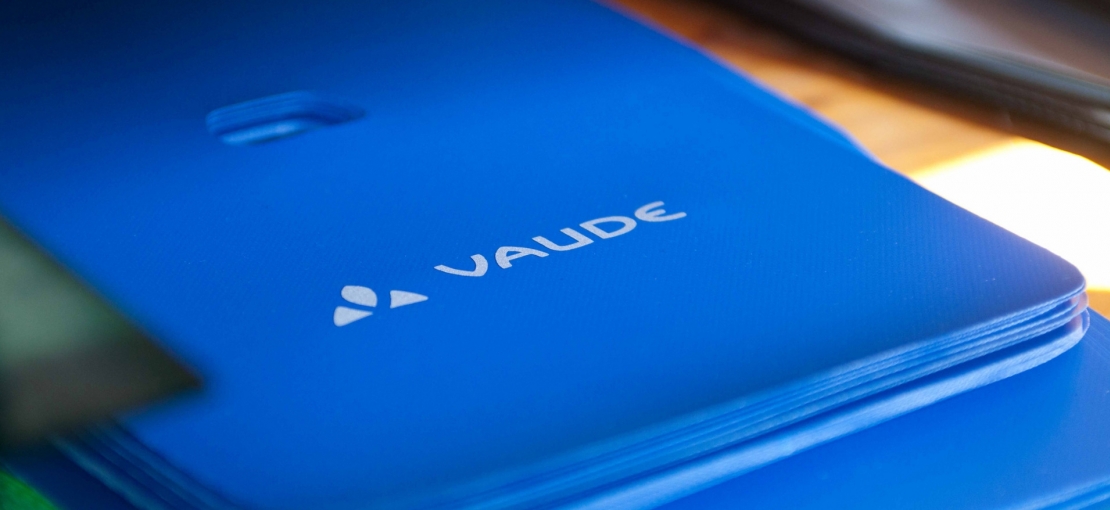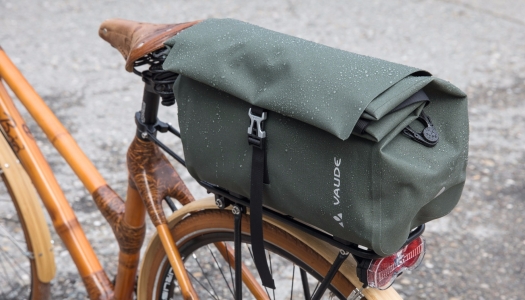
The challenges of PVC-free
The entire Made in Germany bag collection is PVC-free
VAUDE manufactures an important part of its Bags Collection in Tettnang with climate-neutral production (more here.) Our legendary bike bags belong to this group. The entire standard Made in Germany Collection has already been fully PVC-free for many years.
Starting with the Summer Collection 2017, all special models (for example, those we manufacture here for major customers) will also be PVC-free. The entire Mountain Collection is also PVC-free.
VAUDE tents, apparel and shoes are also 100% PVC-free.
What is actually the problem with PVC?
PVC (Polyvinyl Chloride) is a very stable and durable plastic that is widely used for hard plastics such as water pipes – but also widely used in the manufacturing of canvas-like products such as truck tarpaulins are even bags.
One problem with the plastic PVC is the phthalates that they often contain. Phthalates are plasticizers that are added to keep PVC from becoming brittle. Phthalates are suspected of being carcinogenic. While strict limits to their use do exist, these have to date only been in effect for children’s products.
Plasticizers can outgas
PVC is not only problematic due to the use of plasticizers; it is problematic throughout its entire lifecycle. PVC itself is inert (non-reactive, non-effective) and non-toxic.
Plasticizers are “only” a problem during their utilization phase as they can outgas from finished PVC. The plasticizers used by VAUDE are approved in accordance with European chemical legislation (REACH).
In addition, the production of PVC and its disposal involves other serious environmental and health problems.
PVC manufacturing is problematic for humans and the environment
PVC production starts with the gas vinyl chloride, which has been known to be carcinogenic since the 1960s. It triggers “vinyl chloride disease”, recognized as an occupational disease.
In addition, toxic chlorine compounds are used as flame retardants, and larger amounts of heavy metals, particularly cadmium, are needed for the production of PVC, which partly remain detectable in the finished product.
Landfilling of PVC is illegal in Germany
It is virtually impossible to recycle PVC as it consists of various polymers which can only be separated again under extremely high energy and water use.
If PVC is deposited in a landfill, plasticizers and other harmful substances such as heavy metals leech into the soil, air and groundwater. In Germany PVC landfilling is illegal.
During the combustion of PVC in incinerators, toxic hydrogen chloride, dioxins and other hazardous pollutants are created. Therefore, PVC is not suitable for energy production through combustion in furnaces or in the cement industry.

|
Guaranteed waterproof
Our “Comyou” Collection is made entirely without the use of PVC and therefore can be named “PVC-free”. |
Waterproof with eco-friendly alternatives
VAUDE continues to use PVC in some travel bag models. This material does not contain any phthalate plasticizers, is REACH compliant and it complies with strict limits.
By 2020, we aim to completely eliminate the use of PVC. This is a real challenge, because the material is about 30 percent more expensive and still does not always achieve the same quality – for example, in cold temperatures it becomes brittle.
Percentage of PVC-free models in Packs ´n Bags (travel bags)
Create your own infographics| GRI: | G4-EN1 |
| GRI: | G4-PR6 |






